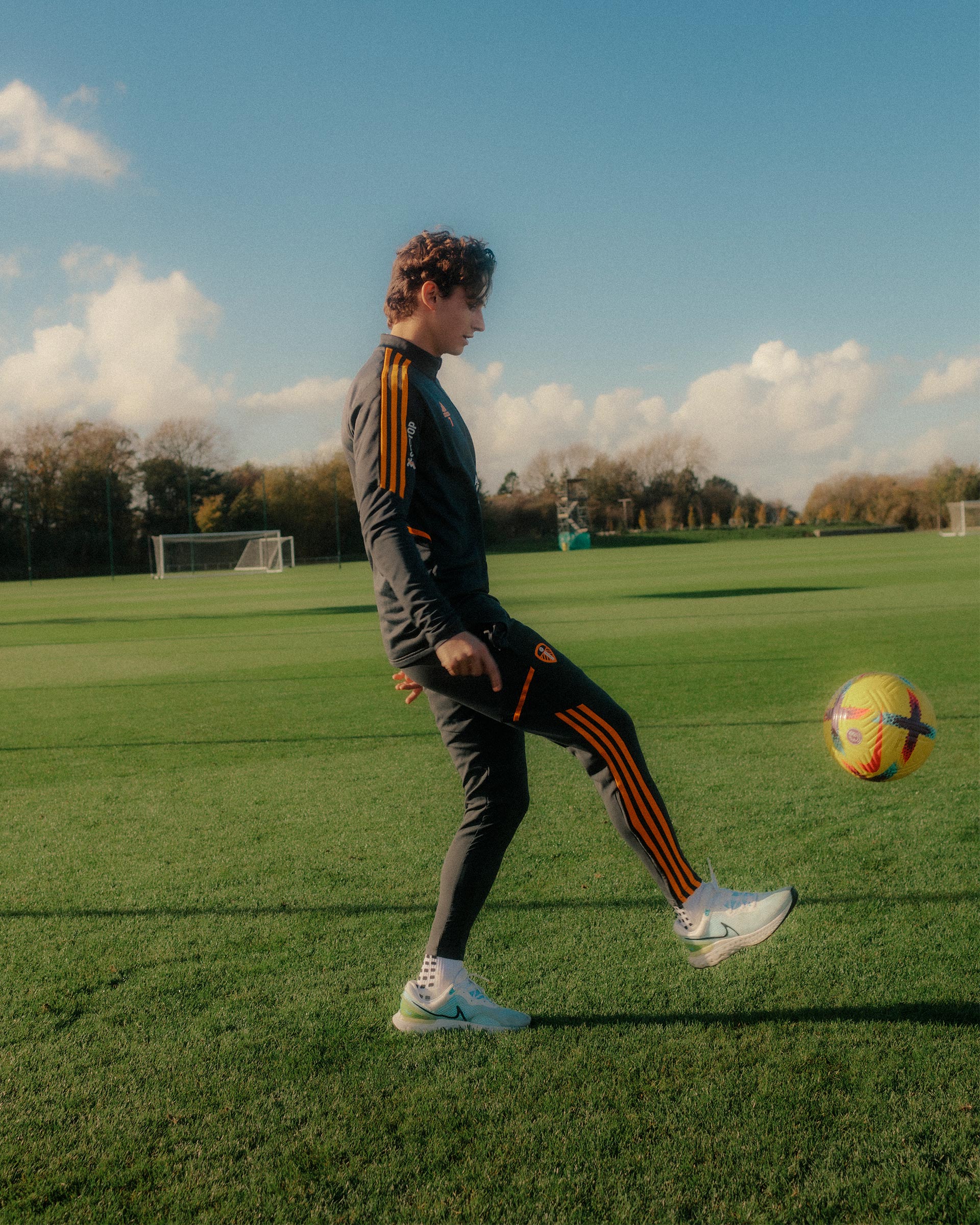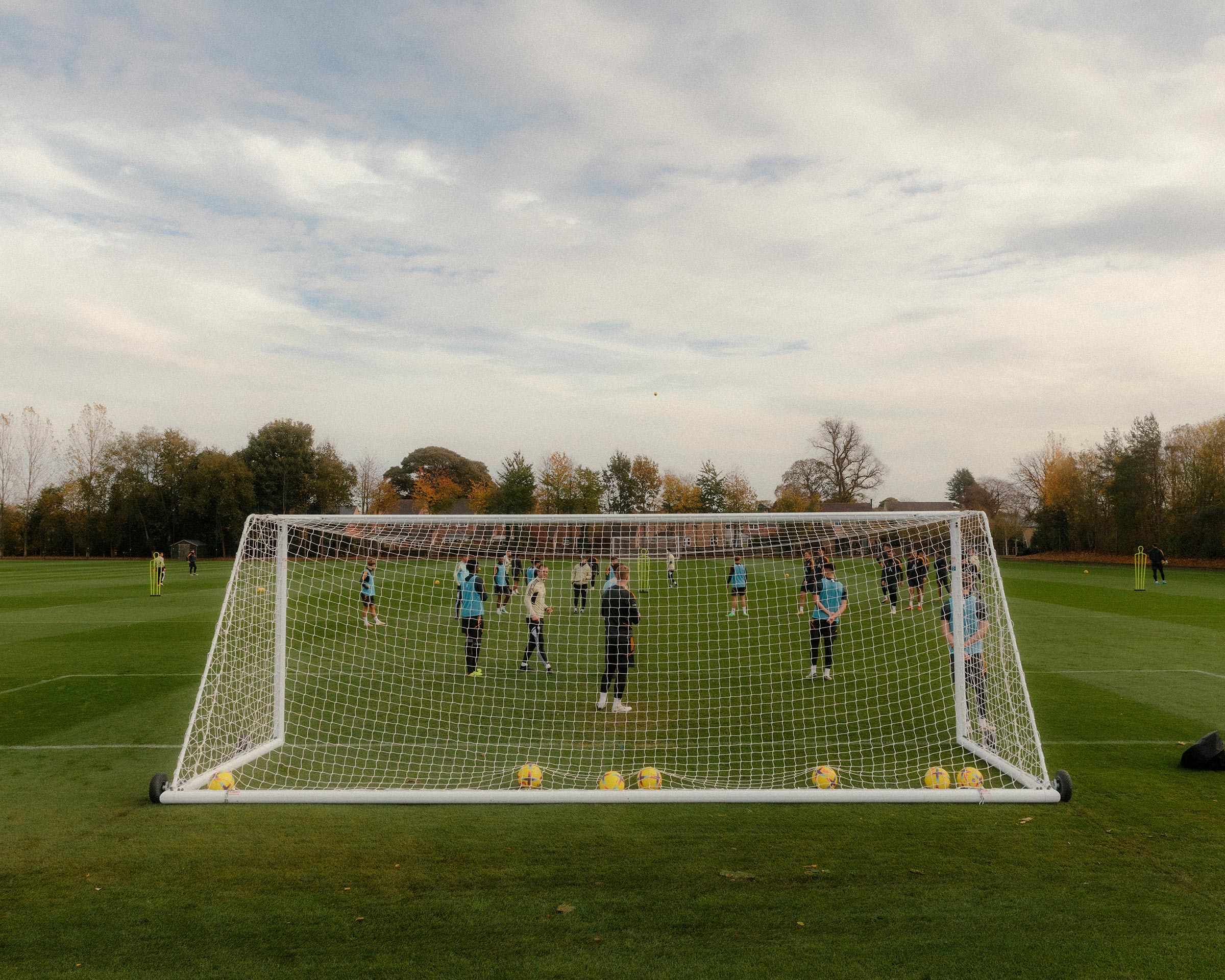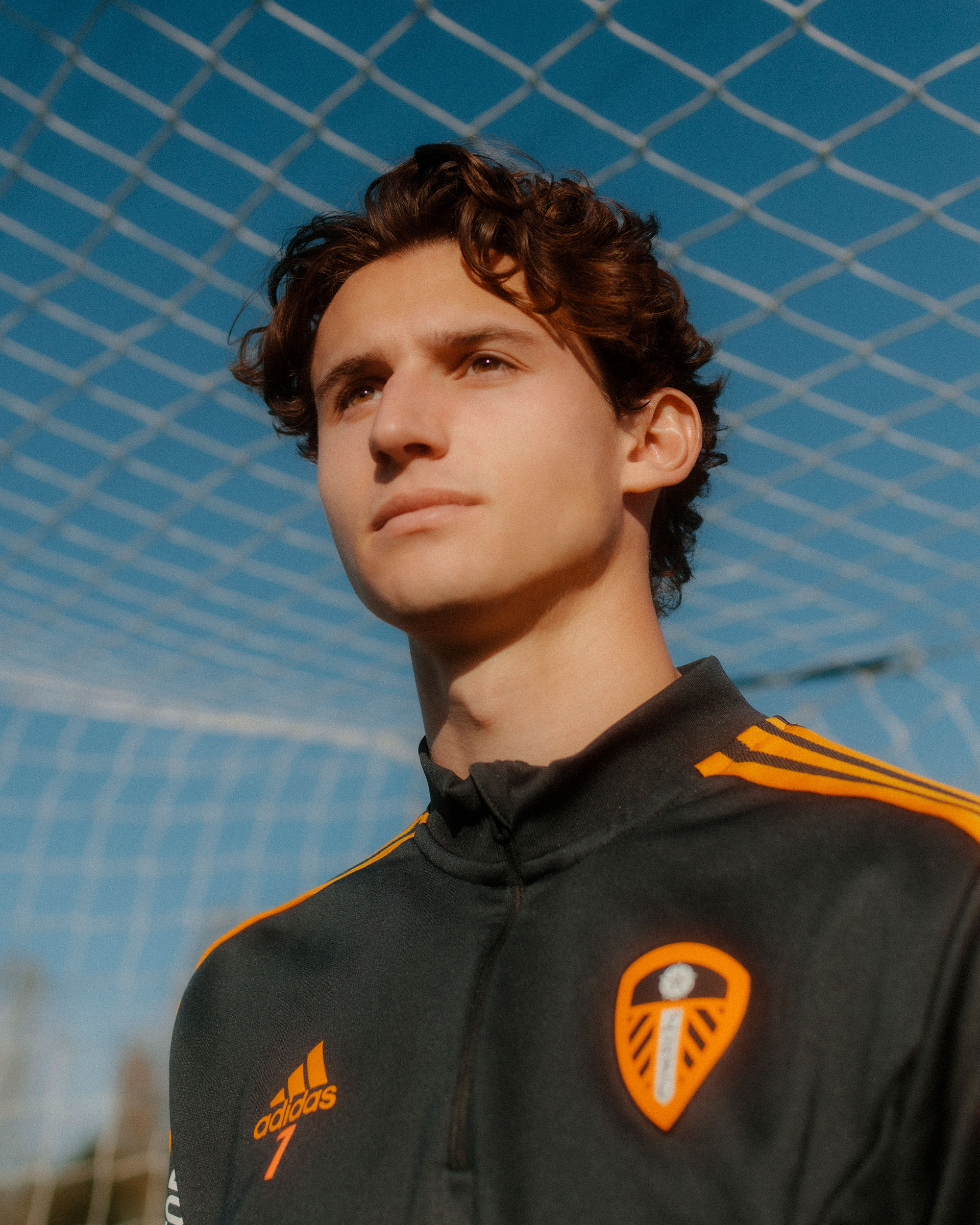A piercing whistle blast officially marks the end of soccer training on a squally afternoon at Leeds United training ground in northern England—but Brenden Aaronson isn’t heading for the showers just yet. As his exhausted teammates trudge toward the locker room, Aaronson places a ball 25 yards from goal, takes a breath and pings a fearsome shot into the far top corner. And then another. Not that the 22-year-old New Jersey native considers the extra scrub anything out of the ordinary.
“Normally I’m the last one out there shooting but today I was just messing around,” he tells TIME in an exclusive interview on Nov. 3. “I ran so much in our last game that I had a little bit of a calf strain.”
That last game was a stunning 2-1 victory for Leeds over title challengers Liverpool, during which Aaronson ran 8.2 miles—the farthest any English Premier League (EPL) player has managed all season. It’s a work ethic that combined with Aaronson’s deft ball control, tactical nous and passing alchemy persuaded Leeds to stump up $30.2 million for his signature in May—the second-highest fee ever paid for an American, after Christian Pulisic—and has propelled him to be the U.S.’s hottest soccer prospect for generations, carrying a huge weight of expectation into the World Cup in Qatar.
A youthful U.S. team has had mixed results going into the tournament—most recently a 2-0 defeat to Japan and a goalless draw with Saudi Arabia—but Aaronson is confident there’s sufficient quality in the squad to claim a few scalps. The U.S. team’s three group stage matches start against Wales on Nov. 21, followed by England on Nov. 25 and Iran on Nov. 29, with only the top two from the quartet qualifying for the knockout stages.
“Yeah, we’re underdogs,” says Aaronson, who grew up in Medford, N.J. “But going into the World Cup … we want to win, so we’re going to give it our all and try to go to the final.”
Read More: Your Complete Guide to the U.S. Men’s National Team at the 2022 World Cup in Qatar
It’s a hard-nosed attitude that persuaded Leeds United manager Jesse Marsch—who in February became just the third American to manage an EPL team—to build his team around Aaronson and former New York Red Bulls midfielder Tyler Adams, who is also heading to Qatar. “He’s a silent assassin type,” Marsch says of Aaronson. “He’s just the nicest kid, you don’t think that he’s a hard-edged guy, but when it comes to game time, he’s willing to do whatever it takes to find a way to succeed.”

Alliteration demands that Aaronson is dubbed by fans the “Medford Messi”—after diminutive Argentina legend Lionel Messi, who will also be playing in Qatar—although he in fact lists his soccer idols as former England midfielder Steven Gerrard and Spain striker Fernando Torres, who both starred for Liverpool in the 2000s. “I wear my hairband because of Fernando Torres,” Aaronson reveals. “I got [the style] from him.”
Aaronson played all kinds of sports as a kid, including baseball, basketball, lacrosse, and American football. But soccer was always his passion and one he happened to share with his private investigator father, Rusty, who played college soccer for Monmouth University.
“From a young age, my dad always told me that ‘I want you to be the one that runs the most,’” says Aaronson. “It was never ‘train like this, do that,’ the only thing he wanted from me was just to work harder than anybody else.”
More from TIME
The elder Aaronson even set up a youth soccer team in the neighborhood chiefly to provide his son with a competitive sporting environment to nurture his undoubted potential. “[My dad is] the most important character in my career,” says Aaronson. “I’ve had a lot of fantastic coaches over the years, but my dad is the number one person in my life who has helped me get to where I am today, and who I based my morals off.”
Aaronson played for Philadelphia Union’s youth teams from the age of 13, joining the Union-run high school at YSC Sports in Wayne, N.J. He says growing up in Medford was “a kid’s dream.” Aaronson and his buddies would bike all over the town, which is interspersed by small lakes. Summers revolved around playing soccer in friends’ backyards and then diving into the water to cool off. “I was fortunate to grow up the way I did.”
He was accepted to attend Indiana University before deciding at the 11th hour to instead sign a professional contract with the senior Union team, where his 19-year-old brother, Paxten, plays today. Asked which of the siblings is the superior player, Aaronson grins and throws his younger brother a tribute, even if fraternal rivalry prohibits full bragging rights.
“My brother is so talented,” he says. “I always like to say how good he is. He’s going to get more chances as he gets older because he’s still young, of course.” Notably, both brothers scored in their first Major League Soccer (MLS) starts.
As for his own game, Aaronson’s not coy about areas where he can improve. “There’re so many things,” he says. “I can score more goals and get more assists. I want to get stronger, so I’ve been in the gym a lot.” He is also first to admit that going professional in his teens was risky coming from an American sports system, where the established route is college and draft, supposedly providing a safety net should things go awry. “It is a different culture [in soccer],” he says. “With me, it was more about just taking the chance of a lifetime.”
The gamble worked. In October 2020, Aaronson was signed by Austria’s Red Bull Salzburg in a deal reported to be worth up to $9 million, the highest transfer fee ever paid for a homegrown American player from the MLS. Aaronson made the transition to Europe seem easy, winning a league and cup double in both his two seasons at the club. But in truth, he says leaving his family to move alone to a faraway country where he didn’t speak the language was a huge challenge at such a tender age. At the Union, Aaronson was still living at home with his mom cooking and caring for him.
“Going to grocery stores, trying to find the food that I needed, there were just a bunch of things that were tough [in Salzburg],” he says. “I was lonely at times, but I got used to it and I really had time to focus on my football and get better.”
The transition from Salzburg to Leeds was easier and Aaronson’s all-action displays immediately cemented his place as a fan favorite. “Leeds are soccer fanatics and in Philly, it’s all sports, so it’s kind of similar,” he says. “The fans are just so loud and really drive us on.” And he’s found English culture easier to adapt to: “I’ve tried the tea, I’m into tea, I change up between coffee and tea,” he laughs. Ultimately, though, there are some South Jersey staples that the U.K. just cannot replicate. “I love the hoagies back home,” he says, “they’re the best.”
While he is currently living alone in the historic spa town of Harrogate near Leeds’ training ground, Aaronson will be joined by his girlfriend—who recently graduated from college in the U.S.—after Christmas, which his parents plan to spend with him in the U.K. “Christmas in England!” he grins. “Can’t wait to see it.”
In the meantime, cognizant of how short and uncertain professional sporting careers can be, he’s been knuckling down to online college courses at Southern New Hampshire University arranged as part of his Union deal. “I’m not really sure what I want to specialize in,” he admits. “I’m just getting some credits done but have been slowing down a little bit because it’s been busy and then the World Cup is coming up.”

Nobody is sure quite how this Team USA will fare on the world’s biggest stage. Coach Gregg Berhalter made the bold choice to ditch the fading veterans—who flunked their bid to qualify for the 2018 Russia World Cup—and instead cultivate a youthful squad with the energy and athleticism to engage an aggressive pressing style. Aaronson’s tireless running and ability to retain the ball under pressure encapsulates the shift from the previous generation’s direct approach to a more sophisticated possession-oriented philosophy.
But whereas Leeds have built their team around Aaronson as the playmaker roaming behind their main striker, Berhalter has leveraged his versatility, deploying him variously on either wing or farther back in deep midfield. “Gregg is very tactically aware and I learned a lot from him,” says Aaronson. “In the national team, I sometimes have to roll up my sleeves and play wider and deeper. It’s just about being flexible.”
While the squad’s talent is undeniable, a deliberate focus on youth, coupled with the fact the U.S. failed to qualify last time out, means big tournament experience is sorely lacking. Much will hinge on how well Berhalter, who himself was part of the U.S. squad that made the World Cup quarter finals in 2002, can guide his young charges. Those who know Aaronson best don’t expect the occasion to overwhelm him, though. “Brenden can have a big World Cup, no doubt,” says Marsch.
Regardless of the team’s performance, the popularity of soccer is set to keep rising in the U.S. Cultural phenomena like the success of shows Ted Lasso and Welcome to Wrexham, as well as the fact the next World Cup in 2026 is being held across North America, is belatedly boosting the global game at home.
“By the 2026 World Cup, I think [soccer] will overtake some other sports in America … It’s rising up to baseball” says Aaronson. “2026 is going to be hysteria in the country—and it’s going to be awesome to see.”
More Must-Reads from TIME
- Why Trump’s Message Worked on Latino Men
- What Trump’s Win Could Mean for Housing
- The 100 Must-Read Books of 2024
- Sleep Doctors Share the 1 Tip That’s Changed Their Lives
- Column: Let’s Bring Back Romance
- What It’s Like to Have Long COVID As a Kid
- FX’s Say Nothing Is the Must-Watch Political Thriller of 2024
- Merle Bombardieri Is Helping People Make the Baby Decision
Write to Charlie Campbell/Leeds, United Kingdom at charlie.campbell@time.com
